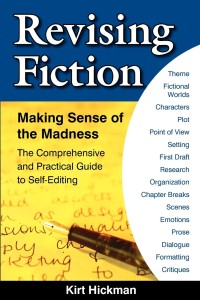by Kirt Hickman
Your opening scene must accomplish several things:
Make it clear from the outset who your hero is
Write the first scene of Chapter 1 from your hero’s point of view. I go a step further and make my hero the first named character in the book. Your reader will pick up on these cues. If you start Chapter 1 from the viewpoint of some other character, your reader will incorrectly assume that this character is the hero, which might cause confusion later on.
Show your hero’s ordinary life
Your story should pull the hero away from his ordinary life. Before it does, however, you must show the reader what that life is like. This will help the reader understand the impact the crisis will have on that life and on the hero. Show the reader what kind of person your hero is. Give her a moment to connect with him in a setting she can understand and relate to.
Hook your reader
Many people will read the first page of a book while they’re standing in the bookstore deciding which book to buy. If your story doesn’t rev up by the bottom of the first page, you’ll probably lose these readers. Therefore, give your hero an immediate desire, even if it’s just a cup of coffee, and place an obstacle between him and the thing he wants. Otherwise your opening will lack tension.
My first novel, Worlds Asunder, begins:
“It was really embarrassing.” Edward “Chase” Morgan drew the top card from the deck: the queen of diamonds. “We’d just returned from hitting a crack factory and warehouse in Cuba. This was back when President Montros thought he could stop the drug trade with air strikes.”
He tapped his cards on the table. Michelle Fairchild, his materials engineering intern from Mars Tech, had won every game that evening. Not this one, though, if he could help it. Chase needed just two cards to win and Michelle hadn’t laid down any of hers. Unfortunately, the queen wasn’t one of the two. He tossed it onto the discard pile.
Smiling, Michelle picked it up, then placed it and two others on the table. Chase groaned. That group put her in the lead and, at double or nothing, the credits were starting to add up.
The opening dialogue promises an embarrassing story about my hero, Chase Morgan. It hooks the reader in just four words. The rest of the paragraph reveals Chase as an adventurous character, the card game gives him an immediate want, Michelle presents an obstacle to victory, and the credits provide the stakes of the game.
Make your hero likable
As the scene progresses, I show Chase caring (in a paternal manner) for both his intern and his dog, poking fun at himself, and losing the game graciously. The scene gives the reader several reasons to like him.
Define your hero’s goal
Because you need to show a snippet of your hero’s normal life before crisis disrupts it, you might not introduce the external conflict (your hero’s goal in the story) until some time later. Nevertheless, reveal his goal before the end of the first chapter. In Worlds Asunder, I do this about two pages later:
The comm panel buzzed. Chase stretched his lanky frame and got to his feet, then leapt to the terminal against the slight lunar g.
“We’ve got a ship in trouble,” Security Chief Stan Brower said. “The Phoenix. Snider needs you to assemble a team…”
[Chase] logged into NASA’s data net and scanned the Phoenix file. He scrolled past the physical statistics— size, class, thrust-to-mass ratio—and came to the corporate data.
OWNER: Stellarfare
CREW: Randy Lauback, Phyllis Conway
He read the last line again. His investigations career had come full circle, it seemed. It would end where it had begun. With Randy Lauback.
Chase knew then that he had to take the case, however long it might last, and follow it through to completion. He owed Randy that much.
This not only defines his goal, solving the Phoenix case, but also gives him a personal stake (some unspecified, yet important, history involving the ship’s pilot).
If you haven’t accomplished all these things by the end of Chapter 1, find ways to do so. This may mean deleting scenes from the beginning of your book and starting the story when the crisis occurs; it may mean changing the viewpoint character of the opening scene or moving a different scene—one written from the hero’s viewpoint—to the front of the book; or it may mean accelerating the pace by moving background information to later pages.
 Kirt Hickman is a technical writer turned fiction author. His books include three sci-fi thriller novels Worlds Asunder (2008), Venus Rain (2010) and Mercury Sun (2014), the high fantasy novel Fabler’s Legend (2011), and the writers’ how-to Revising Fiction: Making Sense of the Madness (2009).
Kirt Hickman is a technical writer turned fiction author. His books include three sci-fi thriller novels Worlds Asunder (2008), Venus Rain (2010) and Mercury Sun (2014), the high fantasy novel Fabler’s Legend (2011), and the writers’ how-to Revising Fiction: Making Sense of the Madness (2009).
This article was originally published in the March 2010 issue of SouthWest Sage, and is reprinted here by permission.



Leave a Reply